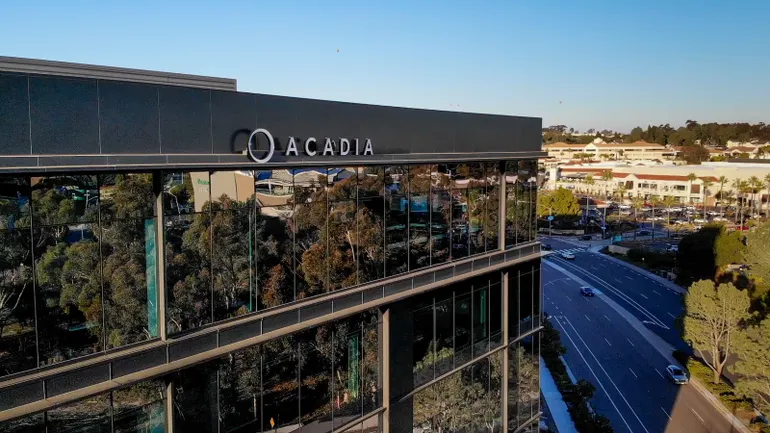
Acadia Pharmaceuticals Unveils Ambitious Growth Strategy, Eyes $12 Billion Pipeline with Female-Led R&D Powerhouse
More than three decades after its founding in 1993, Acadia Pharmaceuticals is embracing a bold new chapter, unveiling what it calls a biotech transformation under the guidance of CEO Catherine Owen Adams and Head of R&D Elizabeth (Liz) Thompson. Both women, who joined the company less than a year ago, have set their sights on redefining the company’s trajectory—steering Acadia from a mid-sized neuroscience and rare disease biotech into what they envision as a “biotech powerhouse.”
The company recently hosted its inaugural R&D Day, a milestone moment in its 32-year history. During the event, Acadia projected that its growing pipeline—comprising seven experimental assets alongside two commercial products—could one day support up to $12 billion in annual revenue, signaling a bold vision for its future in neurological and rare disease treatment innovation.
“We’re a small biotech now, but we have aspirations to be a biotech powerhouse,” said Owen Adams in an interview with BioSpace. Since taking the helm in September 2023, she’s focused on two key priorities: stabilizing Acadia’s commercial operations and charting a new growth strategy rooted in innovation, pipeline expansion, and partnership.
Building on a Commercial Foundation: Nuplazid and Daybue
Acadia’s current commercial base rests on two FDA-approved therapies. Nuplazid (pimavanserin), approved in 2016, remains the first and only treatment for hallucinations and delusions associated with Parkinson’s disease psychosis. Meanwhile, Daybue (trofinetide), approved in 2023, became the first-ever therapy for Rett syndrome, a rare neurodevelopmental disorder affecting young girls.
These two products anchor Acadia’s near-term revenue, but the company is betting big on its investigational assets to transform the business further.
“Where are we going? How big could Acadia be?” Owen Adams said. She emphasized that the answers lie in a pipeline that’s no longer being kept under wraps.
For years, the company’s leadership had exercised caution in revealing pipeline details. But with Thompson’s arrival in August 2023, following her tenure as EVP of R&D in rare diseases at Amgen, the tide has shifted. “Previously, there’s been a little bit of reticence about showing too much of the pipeline,” Owen Adams said. “Liz and I really challenged that. We wanted to highlight the near-term opportunities and share our strategic thinking about partnering and portfolio focus.”
Reimagining Neuroscience and Rare Disease Drug Development
Owen Adams defines Acadia as a company operating at the intersection of neurology and rare disease, particularly in treating symptoms of neurodegenerative conditions. Among the company’s lead candidates are assets aimed at psychosis in Alzheimer’s disease and Lewy body dementia, hyperphagia in Prader-Willi syndrome, and treatment-resistant depression.

This places Acadia in alignment with a larger industry trend gaining traction—addressing the full spectrum of symptoms in neurodegenerative diseases, not just cognitive decline. Major players like Bristol Myers Squibb, AbbVie, and Neumora Therapeutics are also pursuing this more holistic approach.
“Whilst memory loss is upsetting, the psychosis and agitation can be even more devastating for families,” said Owen Adams. These behavioral symptoms often lead to earlier institutionalization, not memory loss itself. “I think there will continue to be a lot of focus in this space.”
ACP-204: A Promising Next-Gen Successor to Nuplazid
One of Acadia’s most promising investigational assets is ACP-204, currently in Phase II trials for psychosis in Alzheimer’s disease and Lewy body dementia. It’s designed as a next-generation version of Nuplazid, but without the cardiac safety concerns that have limited Nuplazid’s use in broader populations.
Pimavanserin, at its currently approved dose, avoids QT prolongation—a disorder of the heart’s electrical system that can lead to arrhythmia. However, increasing the dosage for other indications introduces QT risks. “In the elderly, that’s not great,” Owen Adams acknowledged. ACP-204 was thus engineered to minimize or eliminate QT effects, allowing for higher, more effective dosing without the safety trade-offs.
In a June 25 note, BMO Capital Markets analysts described ACP-204 as a key improvement over pimavanserin, citing its potential to allow for faster onset of action, better efficacy, and safer dosing.
For Owen Adams, this compound is also personal. “Each of my parents is afflicted by one of these diseases,” she said. “I understand the devastation it causes for families.”
ACP-101: Carbetocin for Prader-Willi Syndrome
Another standout asset in the pipeline is ACP-101, a carbetocin nasal spray in Phase III development for hyperphagia in Prader-Willi syndrome—a rare genetic disorder characterized by insatiable hunger, obesity, metabolic issues, and cognitive impairment.
Acadia acquired the asset in 2022 through a $10 million deal with Levo Therapeutics, which had conducted a prior Phase III study showing nominal efficacy at a 3.2 mg dose. The drug was well-tolerated, but the FDA requested an additional trial to confirm benefit, leading to Levo’s application being rejected in early 2022.
Rather than viewing the failed trial as a deterrent, Owen Adams saw opportunity. “Just because it came from a failed Phase III study and had a lot of skepticism around it—that makes it all the more exciting,” she said.
Acadia has since accelerated enrollment for the ongoing Phase III trial, pulling forward the expected readout timeline from 2026 to the fourth quarter of 2025. Owen Adams is confident that if the drug delivers, it could become a game-changing treatment for a population with few therapeutic options.
ACP-211: A New Entrant in Depression Treatment
While Owen Adams champions ACP-204 and ACP-101 as front-runners, analysts are most bullish on ACP-211. This candidate, now in Phase I, is being developed for treatment-resistant depression and major depressive disorder. It’s an orally available, deuterated form of R-Norketamine—a chemical cousin to esketamine (Spravato), which has already shown success in major depressive disorder through Johnson & Johnson’s Janssen unit.
Analysts at BMO Capital Markets consider ACP-211 a strong candidate with validated potential, expecting it to enter Phase II trials by the end of 2025.
Course-Correcting Daybue After Setbacks
Despite Daybue’s historic approval in March 2023 for Rett syndrome, its commercial rollout has been uneven. After a strong start, Acadia faced setbacks in 2024, with reports of gastrointestinal side effects discouraging sustained patient uptake.
“We had a pretty difficult 2024 with flat to declining patients,” Owen Adams admitted. But the company quickly adapted, implementing a dose titration strategy and launching an educational outreach campaign to families.
As a result, patient numbers are once again on the rise, suggesting that the company has successfully course-corrected on one of its two revenue-generating products.
A Leadership Team That Breaks the Mold
Acadia’s revitalized leadership is not just ambitious—it’s also atypical for the biotech industry. Owen Adams and Thompson represent a rare female-led CEO and R&D combo, a notable distinction in a field where executive leadership remains male-dominated.
“We may be the only female CEO/head of R&D combination in biotech,” Owen Adams noted. They’re joined by Chief Legal Officer Jennifer Rhodes and Chief Medical Officer Ponni Subbiah, reinforcing the company’s diversity at the highest levels.
With a strong commercial base, a reinvigorated pipeline, and a leadership team intent on driving the company toward the next echelon of biotech success, Acadia is clearly signaling its intention to become a formidable force in neuroscience and rare diseases.
The next 12 to 18 months will be pivotal, with multiple clinical readouts expected, particularly from ACP-101 and ACP-204. Meanwhile, new trials for ACP-211 are set to begin, and Daybue is regaining commercial traction. Acadia may still be considered a mid-tier biotech for now, but under the direction of its newly minted leadership, it’s setting its sights on a future as an industry giant.





